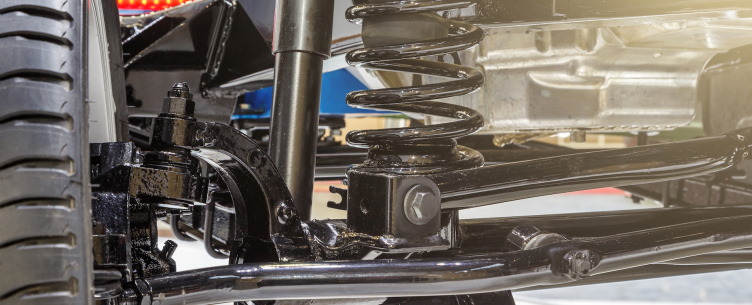Is it Time to Check Your Suspension?
Published on: Tuesday, 26 October 2021 | Author:
Is your car bouncing when you drive? Have you noticed strange noises when you turn or brake? If so, you might need to check your suspension.
Contrary to popular belief, your car’s suspension isn’t a luxury extra that magically improves your driving experience. Instead, suspension is a fundamental part of vehicle handling and driving.
By increasing the friction between your tyres and the road surface as much as possible, the suspension works to improve the handling of your vehicle, even on the most irregular of surfaces. What’s more, when conducting emergency manoeuvres like sharp turns or stops, your suspension helps keep you safe.
That being said, suspension is definitely something worth checking. And, while it doesn’t require as regular maintenance as, say, your tyres, there are lots of warning signs you should know to look out for to keep your suspension in check.
Read on to find out if it’s time to check your suspension.
When should you get your suspension checked?
Though it’s a good idea to regularly check your suspension, we know that not every driver has the time. In which case, coupling a suspension check with other routine car maintenance procedures like MOTs and services is a great alternative.
Annually with MOT and Service
When booking in your vehicle for its annual MOT, or for a Full Service (every 12 months), you could check your suspension at the same time.
You can either do it yourself or let a Tyre Pros specialist technician do it for you, since every Full and Interim Service comes with a full visual brake, engine & suspension check.
During tyre replacement
Getting your tyres replaced is another optimal occasion to conduct a suspension check, since suspension often affects the height of your tyres. Usually, issues with your suspension and issues with your tyre heights go hand in hand, especially if one side of your vehicle sits lower than the other side.
If irregular handling occurs
Aside from knowing when to check your suspension for convenience purposes, it is also important to know what signs your vehicle is giving you that indicate faulty suspension — the first of which is irregular handling. Issues with steering and braking especially indicate underlying suspension problems.
If you struggle to stop quickly after braking, there is likely an issue with suspension.
Other signs to look out for
Strange Noises
If, every time you hit a bump in the road, you hear a discernible squeaking or clunking noise, your suspension might be on the blink.
This noise occurs when the suspension is no longer able to absorb the shock from bumps or sudden changes in terrain and the car receives the direct energy itself — responding with a sound.
Bouncing
Perhaps the most common indication of a suspension issue is a change in the ‘bounciness’ of your vehicle. Using the so-called ‘bounce test’ is a sure-fire way to see if your car’s suspension is still absorbing shock and minimising excessive vertical movement.
To conduct a bounce test, simply park on a flat surface and put all of your weight onto one of the front corners of your car, release and count how many times it bounces. If it bounces more than 2 or 3 times, the suspension is clearly faulty or in disrepair.
How to check your suspension?
While we’d always recommend booking in a suspension check at your nearest Tyre Pros centre, there are a few simple checks you can do at home to be sure of a problem.
Conducting a ‘bounce test’, as we’ve mentioned, is an effective way to check whether your suspension is working or not. Other than this, you can inspect the strut mounts for signs of damage or leakage, but this requires you to jack up your car — a procedure that’s better left to the experts.
If you have any questions about your vehicle’s suspension, tyres, or MOT and servicing, get in touch with the experts at your local Tyre Pros centre who’d be happy to help you!




